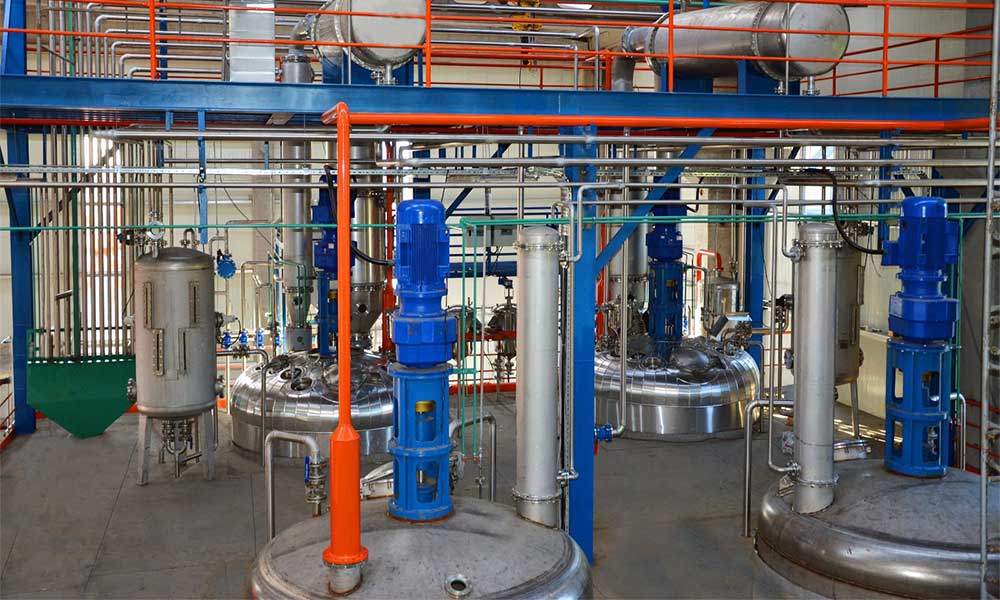
We design and manufacture turnkey alkyd resin production plants at Atommek, providing complete solutions from concept and engineering to installation and commissioning.
Our alkyd resin plants produce high-quality resins used in paints, coatings, adhesives, varnishes, and other industrial applications. By controlling reaction conditions such as temperature, pressure, and reaction time, our plants ensure consistent resin properties, high performance, and superior quality.
Applications
Alkyd resins produced in our plants are widely used in:
- Industrial and decorative paints
- Varnishes and coatings
- Printing inks
- Adhesives and binders
- Automotive and construction applications
Packaging & Shipping
Atommek ensures secure and efficient packaging and shipping of all alkyd resin products, preserving quality during transport.
R&D and Factory
Our R&D and production teams focus on innovation, quality control, and optimized production efficiency.
Alkyd Resin Plant Installation
Atommek provides end-to-end services for alkyd resin plant installation, including design, construction, commissioning, and operational support. Our experienced engineers and technicians ensure plants are fully compliant with safety and environmental standards.
Custom-designed alkyd resin plants combine:
- High-efficiency production
- Process control optimization
- Safety and environmental compliance
- On-time project delivery within budget
What is Alkyd Resin?
Alkyd is a type of polyester synthetic resin created by the polycondensation reaction of polyhydric alcohols and dibasic acids and modified with oil or fatty acids.
Considered one of the earliest studies of polyester resins, Berzelius’s work in 1847 started with the reaction of tartaric acid and glycerin. After World War II, alkyd resin research accelerated, and these resins began to be widely used in paint and varnish manufacturing.
The word alkyd comes from alcohol and anhydride, and the polyester component provides hardness, while the oil and fatty acids improve flexibility, adhesion, pigment wetting, and solubility with solvents.
Alkyd resin is a key building block of paint and varnish systems, directly affecting film formation and determining critical coating properties such as:
- Physical and chemical resistance
- Adhesion
- Durability
Conventional alkyds remain widely used, and their chemical structures allow for cold blending with most resins or radical groups, or modification as “hot blends.” Today, trends favor high-solid systems and emulsified alkyds, improving performance and sustainability.
How Alkyd Resin is Produced
Alkyd resin is produced by the esterification of polyhydric alcohols and dibasic acids, modified with oils and fatty acids at temperatures between 200–240 °C.
There are two main production methods:
- Process with Solvent – After loading the reactants, water generated from the esterification reaction is removed via an azeotropic mixture with the solvent. Polycondensation continues until the desired acidity and viscosity are achieved.
- Process without Solvent (Fusion) – Water from the reaction is removed using an inert gas and vacuum. This method is especially used for long oil alkyds.
Our plants are designed to provide precision, safety, and efficiency at every stage of production, ensuring high-quality alkyd resins for industrial and commercial applications.
Alkyd Resin Production Facilities
- Short-oil Alkyd Resins – Fast-drying, high gloss, ideal for decorative coatings.
- Medium-oil Alkyd Resins – Balanced properties for general-purpose coatings.
- Long-oil Alkyd Resins – Flexible, durable, suitable for industrial applications.
- Modified Alkyd Resins – Tailor-made properties for specialized applications.
Check our Projects Page to see our completed alkyd resin plants and industrial installations.